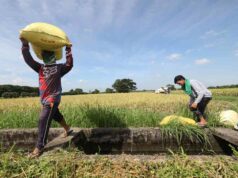 THE Department of Tourism (DOT) hopes to develop more agri-tourism sites nationwide amid slowing growth in the farming sector.
THE Department of Tourism (DOT) hopes to develop more agri-tourism sites nationwide amid slowing growth in the farming sector.
The department has accredited about 100 such sites, some of which were promoted at the second Philippine Harvest event which sought to highlight organic produce and sustainable tourism.
Tourism spokesperson Benito C. Bengzon, Jr. said the department is currently finalizing a five-year farm tourism strategic plan, which calls for more such sites to be developed and promoted.
The plan hopes to raise farm revenue and “strategically also make people appreciate farm tourism in the Philippines,” Mr. Bengzon added.
Details of the program are set to be finalized by September, by which time the department hopes to release the target for farms it hopes to convert to agri-tourism ventures.
“Another thing we have to work on is to look at the existing potential farm tourism sites across the country. We have to do this with the Department of Agriculture (DA),” he added.
The DA will be responsible for identifying the farm sites.
“We have to talk to farmers and tour operators because they play the crucial role in whatever packages are commercially viable.”
One of the accredited sites, Amancio Farm Hotel in Isabela province, is considered a model that the department hopes to reproduce.
Starting as a 45-hectare multi-purpose organic farm in 2012, Amancio’s farm head Arnold F. Reyes told BusinessWorld that a hotel was built two years later when the farm started attracting visitors.
The hotel kitchen uses organic produce from the farm, human resources and marketing head Claire O. Pinera said.
“Even in the vicinity of the hotel, all we plant are vegetables,” Ms. Pinera said.
“We are promoting organic foods especially to our guests. Most of the time, they are unaccustomed to the taste. We are explaining the benefits that organic food gives them,” Ms. Pinera said.
The farm’s five-hectare pond supplies fish for direct consumption or for processing as buro, a fermented preparation of fish, rice and shrimp. The site also includes livestock, with carabaos supplying fresh milk to the hotel.
Coffee and black, brown and red rice are is also sourced from the farm.
Despite the small share of black, brown and red rice bring planted in the province, Ms. Pinera noted that growing health consciousness could point to a potential market for these varieties.
“We want to bring back the lifestyle from before when it comes to eating so that visitors can see what good organic food is doing in their bodies. Now, we are getting so many kinds of illnesses because of what we are eating.” — Anna Gabriela A. Mogato



